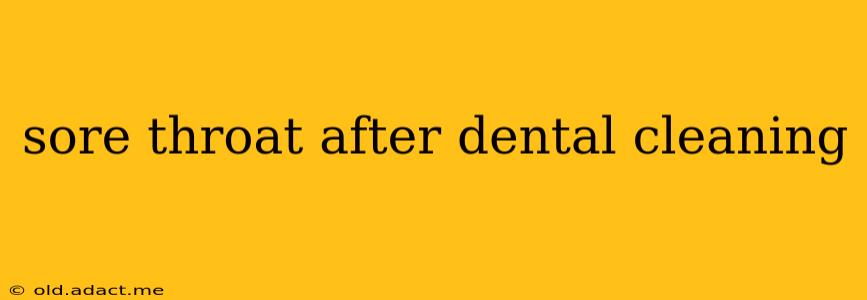A sore throat after a dental cleaning is a surprisingly common experience, leaving many patients wondering what caused it and how to alleviate the discomfort. While usually temporary and not serious, understanding the potential causes and implementing preventative measures can significantly improve your post-cleaning comfort. This comprehensive guide will explore the reasons behind post-dental cleaning sore throats, offer effective remedies, and provide valuable tips for prevention.
What Causes a Sore Throat After a Dental Cleaning?
Several factors can contribute to a sore throat following a dental cleaning. The most common culprits are:
-
Mouth Irritation: The cleaning process itself, involving scaling and polishing, can irritate the soft tissues in your mouth and throat. The instruments used, even with gentle handling, can cause minor abrasions or inflammation. This is especially true if you already have sensitive gums or a pre-existing throat irritation.
-
Dehydration: Many dental procedures, including cleanings, can lead to dehydration, as you might not drink as much as usual during the appointment. Dehydration can worsen existing throat discomfort or even trigger a sore throat.
-
Postural Drainage: During the cleaning, you are often positioned with your head tilted back for extended periods. This can sometimes lead to post-nasal drip, triggering a sore throat.
-
Bacterial Infection (Rare): While unlikely, it's possible that a rare bacterial infection could be exacerbated by the dental cleaning, leading to a sore throat. However, this is less common than the other causes mentioned above.
-
Allergies: If you are allergic to certain materials used during the cleaning (though less common for standard cleaning procedures), this can also be a source of irritation.
How Long Does a Sore Throat After Dental Cleaning Last?
The duration of a post-dental cleaning sore throat varies. For most people, the discomfort subsides within one to two days. However, if the pain persists for longer than a few days, or if it's accompanied by other symptoms like fever or difficulty swallowing, it’s crucial to consult your dentist or doctor.
How to Relieve a Sore Throat After Dental Cleaning?
Several home remedies can ease the discomfort of a sore throat after a dental cleaning:
-
Hydration: Drinking plenty of water, warm tea (herbal or with honey), or clear broths helps soothe irritated tissues and prevents further dehydration.
-
Rest: Resting your voice and avoiding strenuous activities allows your body to focus on healing.
-
Salt Water Gargle: Gargling with warm salt water (1/4 to 1/2 teaspoon of salt dissolved in 8 ounces of warm water) several times a day can help reduce inflammation and kill bacteria.
-
Over-the-Counter Pain Relievers: Nonsteroidal anti-inflammatory drugs (NSAIDs) like ibuprofen or acetaminophen can help alleviate pain and reduce inflammation. Always follow the dosage instructions on the packaging.
-
Lozenges or Throat Sprays: Over-the-counter lozenges or throat sprays containing menthol or other soothing agents can provide temporary relief.
Can I Prevent a Sore Throat After a Dental Cleaning?
While not always preventable, you can take steps to minimize the risk:
-
Stay Hydrated Before, During, and After: Drinking ample fluids before, during, and after your cleaning helps maintain optimal hydration and reduces throat irritation.
-
Communicate with Your Dentist: Inform your dentist about any pre-existing conditions or sensitivities. They can adjust their techniques to minimize discomfort.
-
Proper Oral Hygiene: Maintaining excellent oral hygiene before your cleaning can help reduce the need for extensive scaling and polishing.
Is a Sore Throat After Dental Cleaning Serious?
In most cases, a sore throat after a dental cleaning is not serious and resolves on its own within a short time. However, pay attention to the duration and severity of the symptoms. Persistent pain, fever, difficulty swallowing, or other concerning symptoms warrant a visit to your dentist or doctor for proper evaluation.
When Should I See a Doctor or Dentist?
Seek professional medical attention if your sore throat:
- Persists for more than a few days.
- Is accompanied by a high fever.
- Causes difficulty swallowing.
- Is accompanied by other symptoms like swollen glands or a rash.
By understanding the causes, remedies, and preventative measures, you can better manage and minimize the discomfort of a sore throat after your next dental cleaning. Remember, communication with your dentist is key to ensuring a comfortable and successful cleaning experience.
